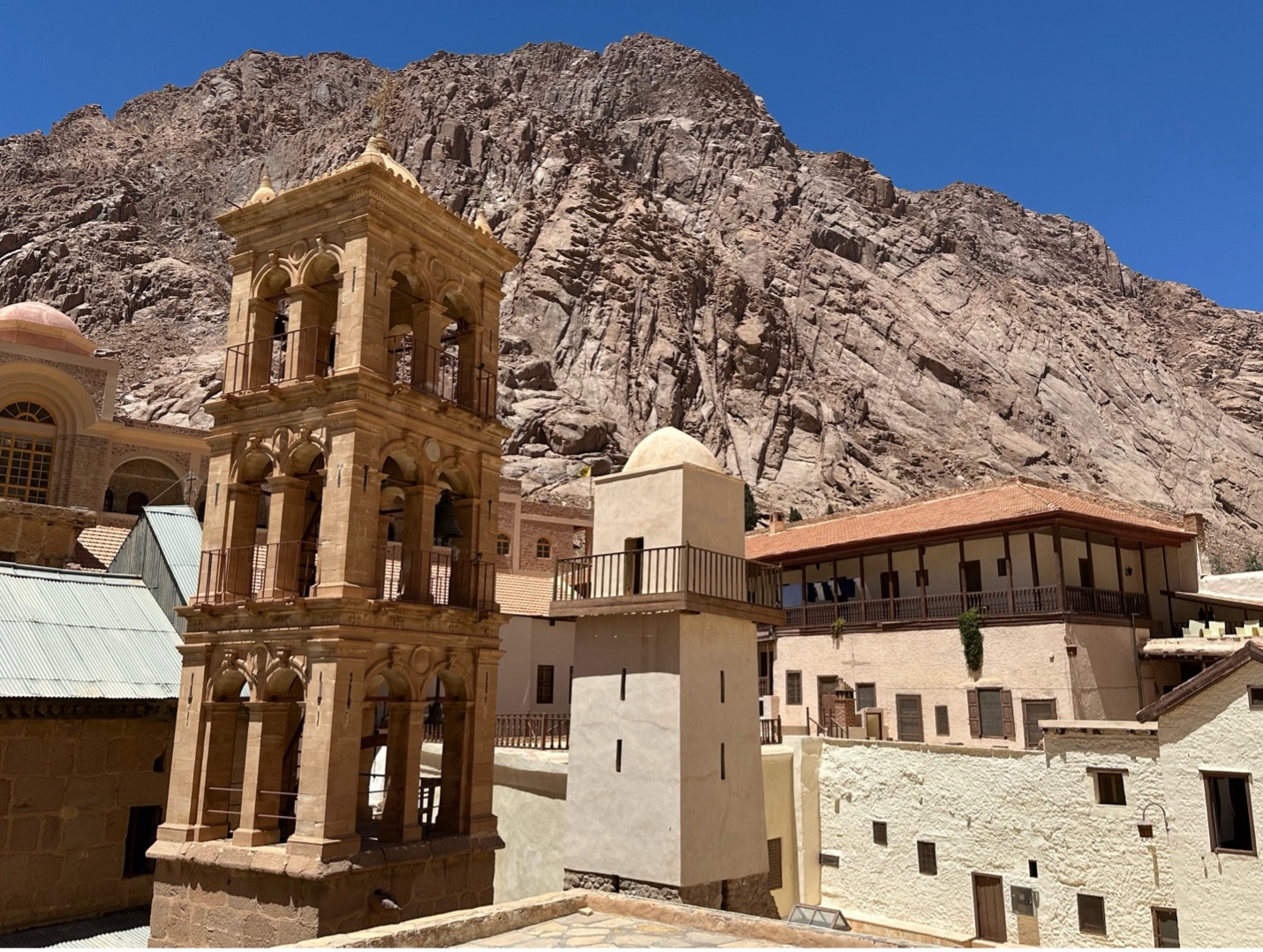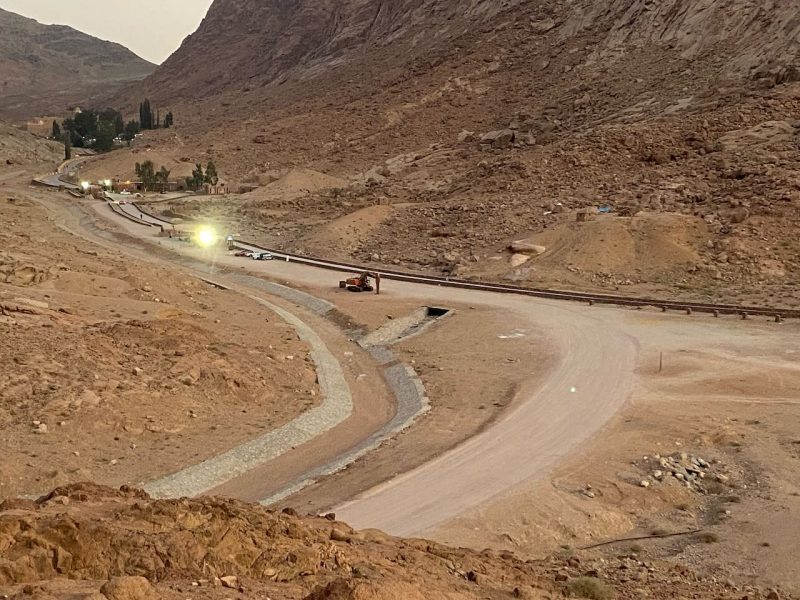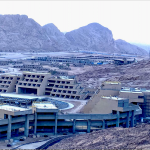By Sarantis Michalopoulos – EURACTIV –
One Greek MEP says Cairo is undermining the very organisation it seeks to lead
Greek politicians make no secret of their opposition to a resort under construction near an ancient Orthodox monastery in Egypt’s Sinai desert. Now there is a new target: Cairo’s candidate to lead the United Nations culture agency, UNESCO.
The 6th-century monastery of Saint Catherine at the foot of Mount Sinai holds significance for Jews, Christians and Muslims. Run by monks from the Greek Orthodox Church, it welcomes over 100,000 visitors each year and safeguards priceless Byzantine icons, mosaics, and early Christian manuscripts.
Yet, with Egypt in the process of building luxury hotels, villas and shopping centres in the surrounding area, the fate of local Bedouins, and the monastery itself, appears uncertain.
In May, an Egyptian court ruled that the monastery sits on state land, but that the monks can continue their religious practices there.

A short time later, Euractiv was granted exclusive access to the site, where monks and local Bedouins expressed concern over whether the monastery would survive. Greek and Egyptian politicians are currently negotiating a long-term political solution.
Now the saga is bleeding into another fight, over who gets to lead UNESCO – the Paris-based body charged with protecting the world’s cultural heritage.
Culture shock
UNESCO’s next director-general will be elected in October, and there are two main candidates: Egypt’s former Minister of Tourism and Antiquities, Khaled El‑Enany, and Firmin Edouard Matoko from the Republic of Congo.
El‑Enany appears to have an edge, having already been endorsed by the African Union, the Arab League and several European countries.
But politicians like Greek MEP Nikolas Farantouris from The Left group, argue that the Egyptian candidacy is incompatible with the resort now under construction near the monastery, which UNESCO considers a site of Outstanding Universal Value.
“We cannot avert our eyes from the symbolism of the timing,” Farantouris wrote in an open letter to UNESCO – as well as European Parliament and the European Commission. “As legal decisions are handed down in Egypt, undermining the Monastery’s patrimony, Egypt simultaneously seeks to assume leadership of the very organization that proclaims itself the guardian of universal heritage.”
Egyptian officials insist that monks will continue to practice their religion without disruption. However, a document seen by Euractiv in August indicated that Egyptian authorities would have oversight over the monastery’s treasure trove, including gilded icons and centuries-old manuscripts.
A UNESCO spokesperson said the agency had asked Cairo to halt further implementation of the tourism project until a Heritage Impact Assessment – a review of how development projects could affect the value of World Heritage sites – could be conducted.
The spokesperson said Egyptian authorities had been asked to safeguard the monastery’s natural environment, preserve its remote setting, and “urgently invite a mission of experts to assess the property and provide guidance to Egypt to ensure that the site is not compromised”.
During a meeting in June, the foreign ministers of Egypt and Greece agreed to “work towards safeguarding the rights of the monastery.” Egyptian Foreign Minister Badr Abdelatty emphasised that the court ruling upholds the monastery’s deep spiritual significance and its respected religious status.
The fate of Saint Catherine’s Monastery and El-Enany’s candidacy to lead UNESCO has also alarmed Coptic Christians, a religious minority in Egypt estimated at 10 million.
Adel Guindy, co-founder and first president of Coptic Solidarity, said El‑Enany and Egypt’s track record are not promising when it comes to upholding UNESCO’s mission.
“There are countless cases of precious icons, manuscripts, or buildings damaged by careless interventions,” Guindy said, citing the demolition of historic sites, poor restoration practices and tight media restrictions.
“A fundamental key to understand Egypt: The state protects, promotes and is in the service of Islam. Everything else must submit,” he added.
The Egyptian presidential office did not respond to requests for comment at the moment of publication.
Local Bedouins ‘overlooked’
For Ben Hoffler, a sustainable tourism consultant formerly based in Sinai, Egypt’s legal actions to strip the monastery of its land rights suggest a lack of genuine intent to preserve the site.

“The welfare of some of humanity’s oldest and most precious cultural landscapes and institutions is being sacrificed to serve the commercial interests of Egypt’s government and its partners,” he said. “I think there are serious questions about whether the monastery will still exist – at least in the form we know it – within one or two decades.”
Hoffler also raised concerns about the local Bedouin tribe, the Jebeleya, who have lost vital ancestral lands due to tourism development, without compensation. Grazing areas and homes have been destroyed, and a major cemetery was exhumed and replaced with a parking lot.
According to Hoffler, a new urban environment is being imposed without the Bedouins’ consent, threatening their nomadic heritage. With 12,000 incoming workers for the resort’s development, he argued that the local community faces marginalisation in its own homeland.
When contacted by Euractiv, El‑Enany’s campaign team was not available for comment.
What the EU will do
EU countries vote individually in UNESCO elections, not as a bloc, and several member states – including France, Germany, Spain, and Austria – have expressed support for El‑Enany.
A source in Paris familiar with UNESCO matters told Euractiv that geopolitical considerations may be at play too.
The EU is seeking to maintain good relations with Cairo, especially following several agreements on green energy and efforts to curb migration from Africa.
“There is a planned undersea cable to transmit renewable energy from Egypt to Europe via Greece,” the source noted, adding that Athens would likely not jeopardise the project.
Greece, in particular, finds itself in a delicate position. Egypt is considered a regional ally in opposing a Turkish-Libyan agreement that redefines maritime zones in the Mediterranean and challenges both Greek and Egyptian sovereignty.
Athens has not announced whether it will support El‑Enany. When asked by Euractiv, Greece’s Permanent Delegation to UNESCO replied that its head of mission, Giorgos Koumoutsakos, was currently out of office.
___________________
https://www.euractiv.com/news/how-a-tourism-mega-project-threatens-egypts-un-culture-candidate/





